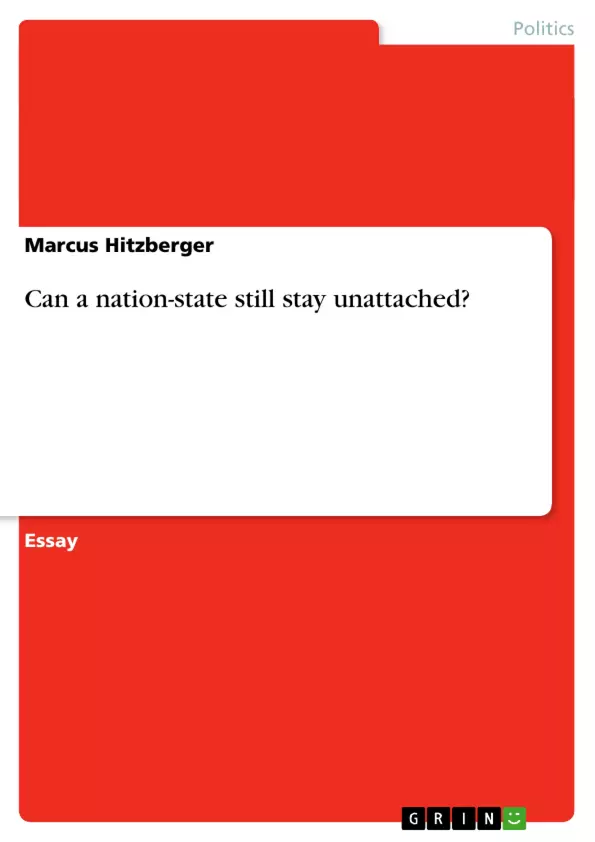How independent are member states of the European Union and what say do they have?
Many fears about the state’s role are present nowadays. Fears that the nation-state will slowly lose its sovereignty within a more and more interconnected world. Fears that these trends will have serious impacts on the effectiveness of a nation-state’s government and finally raising the question about the actual value of a nation-state in times of great internationalization.
Inhaltsverzeichnis (Table of Contents)
- Can a nation-state still stay unattached?
- The nation-state in the European Union and NATO
- Sovereignty and Autonomy
- The European Union
- The Nation-State and its Challenges
- A Summary
Zielsetzung und Themenschwerpunkte (Objectives and Key Themes)
This essay examines the capacity of a nation-state to maintain its independence in an increasingly interconnected world, particularly within the context of the European Union and NATO. It explores the evolving relationship between nation-states and alliances, focusing on the concepts of sovereignty and autonomy.
- The role of nation-states in alliances like the European Union and NATO
- The impact of globalization on national sovereignty and autonomy
- The concept of devolution and its potential impact on nation-states
- The relationship between national and supranational governance
- The challenges facing nation-states in a globalized world
Zusammenfassung der Kapitel (Chapter Summaries)
The essay begins by outlining the historical context of the nation-state and its emergence as a dominant form of political organization following the Peace of Westphalia. It then examines the rise of international organizations, including the League of Nations and the United Nations, as evidence of growing interdependency between nation-states.
The essay explores the European Union and NATO as examples of alliances that have significantly impacted the autonomy and sovereignty of their member states. It delves into the concepts of sovereignty and autonomy, emphasizing the limitations of absolute sovereignty in a globalized world. The essay analyzes the European Union's impact on the decision-making power and effectiveness of nation-states within its framework.
The essay highlights concerns about the nation-state's ability to maintain its traditional functions in a highly interconnected global system, particularly in relation to defense, economic security, and health. It examines the potential for devolution, exemplified by Germany's "Länder" and Spain's "autonomias," to further challenge the authority of national governments.
Schlüsselwörter (Keywords)
The core themes and concepts explored in this essay include the nation-state, sovereignty, autonomy, alliances, the European Union, NATO, globalization, devolution, international cooperation, and the challenges of maintaining national independence in an increasingly interconnected world.
Frequently Asked Questions
How does the European Union impact national sovereignty?
The EU impacts sovereignty by shifting some decision-making powers from the national level to supranational governance, creating interdependency among member states.
What is the difference between sovereignty and autonomy?
Sovereignty refers to the legal right to self-govern, while autonomy relates to the actual capacity of a state to act independently in a globalized world.
What was the significance of the Peace of Westphalia?
It is considered the starting point of the modern nation-state system, establishing the principle of territorial integrity and national sovereignty.
How does globalization challenge the nation-state?
Globalization creates challenges in areas like defense, economic security, and health, where international cooperation often supersedes national independence.
What is devolution and how does it affect states?
Devolution is the transfer of power to subnational levels (like the German Länder), which can further challenge the centralized authority of a nation-state.
- Quote paper
- Marcus Hitzberger (Author), 2005, Can a nation-state still stay unattached?, Munich, GRIN Verlag, https://www.grin.com/document/74803



